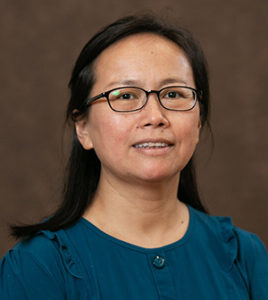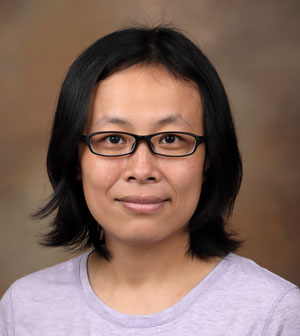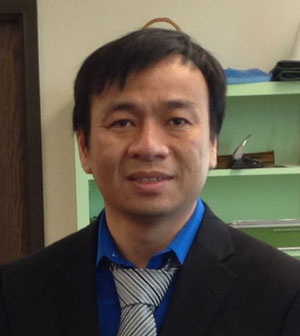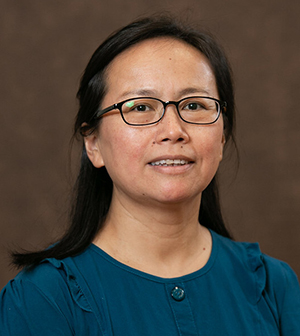Informatics and Mathematics

Full-stack applications development, software application development, technology innovation, data modeling, and deep learning, and other advances in computer science and technology are changing how we work and what we can do for our communities and in our own lives. Technology is advancing in health care, manufacturing, communication, energy, transportation, finance, infrastructure, environment, government, and other areas of society. Emerging technology is allowing us to create new ventures and changing the ways of human-computer interactions as well as human communication with each other. Are you ready to a part of the change?
A degree in technology will help you develop knowledge and skills that you can use to lead change, advance your career, transition to new roles, and make a difference in your community.
In the Department of Informatics and Mathematics, we offer three undergraduate programs, graduate programs, one dual degree, and one certificate program:
Undergraduate programs
- Software Application Development and Human-Computer Interaction, B.S.
According to the Bureau of Labor Statistics, employment for software application developers is projected to increase nationally by over 30% by 2026, adding over 250,000 jobs to the market. Graduates can go on to work as professionals in positions such as mobile app developer, quality assurance engineer, computer systems analyst, UX/UI designer, system architect, or technical consultant. - Information Technology and Informatics, B.S.
Information technology careers are projected to grow 13% by 2026 as IT specialists are employed as computer and information systems analysts, data and quality assurance specialists, as well as system architects, and technical consultants. Graduates are employable in a wide variety of sectors such as service, sales, government, leisure, logistics, warehouse and transportation. - Health Informatics, B.S.
Health Informatics offers students the opportunity to learn and practice how to ethically apply technology in healthcare environments. Graduates will be able to pursue specialized professional positions such as business analyst, clinical information systems analyst, healthcare data analyst, healthcare human-computer interaction designer, hospital IT analyst, or clinical systems engineer.
Graduate programs
- Data Science, M.S.
Graduates are equipped with the knowledge and skills to pursue roles such as artificial intelligence researcher, artificial intelligence specialist, data analyst, data and analytics consultant, data architect, data modeler, data scientist, data storyteller, machine learning researcher, machine learning specialist, natural language processing (NLP) specialist, and more. - Health Informatics, M.S.
The program focuses on the specific needs of this evolving health informatics field. Healthcare is seen as the next biggest field for employment for at least the next two decades in the field of informatics (applied information technology). According to the Institute of Medicine, healthcare in the U.S. has experienced the growing complexity of science and technology and the - Health Informatics, M.S./Doctor of Pharmacy
In the combined Pharm.D./M.S. in Health Informatics program, students will integrate knowledge and skills from both health science and technology domains which builds their capacity to address modern challenges in healthcare ecosystems. Graduates of this combined program have a large range of professional opportunities across the healthcare and IT sectors. The M.S.in Health Informatics courses are designed to enable students to pursue both degrees without compromising the academic demands of the two disciplines.
Certificate programs
- Database Design & Analytics, Undergraduate Certificate
The Database Design and Analytics certificate equips students with the practical skills to design, create, and lead the administration of database management systems. This program empowers students to apply computational and statistical tools to identify trends and generate insights from large data sets. This certificate is available to all Mercer undergraduate students. - Health Informatics, Graduate-Level Certificate
The rapidly expanding healthcare field needs technically knowledgeable professionals to support development of electronic medical and health records, big healthcare datasets, and the need to develop user-friendly interfaces for physicians, allied health professionals, and hospital administrators to effectively use the large and varied data that are being generated by modern healthcare processes. Health technology jobs continue to increase in Georgia.
With a technology major, enroll in core courses like Python programming, database, and systems analysis, and choose specialty courses in Agile methodology, mobile app development, computer IT in healthcare, data analytics, IT innovation, computer information systems management, or network defense.
Online and on-campus classes
We make technology education accessible through completely online courses where you have an option to meet other students and your instructors in real-time video conferencing. If you like to learn on campus, we offer evening, weekend courses on Mercer’s Atlanta campus, conveniently located off of I-85 and I-285. All courses are delivered in eight-week sessions, and you can choose to take a combination of online and on-campus courses to complete your program.
Computational resources for students
Throughout your program, you will develop professional skills through hands-on learning in computer labs, virtual computing environments, optional internships, and real-world projects. You can participate in project-based courses, service-learning activities, and community-based research led by department faculty members.
Departmental resources available to students in the program include 24/7 access to a virtual server that houses all applications required for coursework. You can maintain a portfolio of your work on the virtual server to share with future employers, graduate programs, or others who may be interested in your work. Other resources available to students for coursework, projects, and research includes virtual/augmented reality (VR/AR) equipment, an eye-tracking system, 3D- and high-resolution photography equipment, drones, and mobile devices. The Department employs a dedicated systems manager who is available to support students using the virtual server, equipment, applications, and other technology required for coursework.
Highly-qualified faculty
Your instructors are full-time faculty with graduate degrees or expertise in software development, computer science and information systems, machine learning, computer graphics algorithm, user experience and usability studies, health informatics, probability and statistics, mathematics and business administration. An excellent corps of adjunct faculty bring current industry experience from areas such as full-stack software development, human-computer interaction design, project management and data science.
Supportive community
When you become a student in one of our majors or enroll in a course within the department, you will be joining a collegial and active interdisciplinary group with over 50 students, 82,000 Mercer alumni, three staff, and 9 faculty members who are dedicated teachers and researchers.
Network and develop professional leadership skills by taking advantage of field excursions to professional events organized by our student Informatics Club and UX (User eXperience) Design Club. Join the computer science student honor society UPE supported by the international professional organizations Association for Computing Machinery (ACM) and Institute of Electrical and Electronics Engineers (IEEE). Attend Informatics Day and meet professionals from a variety of technology fields and alumni of the Department programs.
The mission of the Department is to support you as a student to develop knowledge and skills that you can use to make a difference in your community, offer responsible and ethical solutions to real-world issues, and contribute to constructive change in the world.
Please feel free to contact me if you have any questions or would like to know more about our programs.
Feng Liu, Ph.D.
Professor of Informatics and Chair
Department of Informatics and Mathematics
liu_f@mercer.edu
Informatics and Mathematics Programs
- B.S. Health Informatics
- B.S. Information Technology and Informatics
- B.S. Software Application Development and Human-Computer Interaction
- M.S. Data Science
- M.S. Health Informatics
- M.S Health Informatics/Doctor of Pharmacy (Combined Degree)
- Database Design & Analytics Certificate
- Health Informatics Certificate










